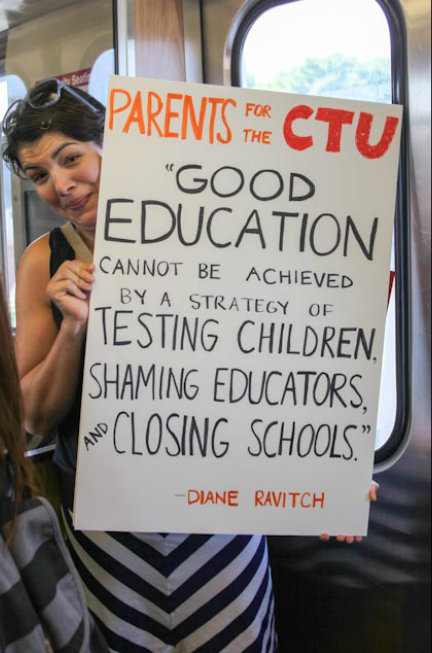Preaching Koch Brothers gospel on public education

By Joe Atkins, Labor South
Barack Obama, then still a U.S. senator from Illinois, said this back in 2006 about teachers, unions and education:
"If we're serious about building a twenty-first century school system, we're going to have to take the teaching profession seriously. … It also means paying teachers what they're worth."
These words, from his book The Audacity of Hope, would seem to put now-President Obama decidedly on the side of the 29,000 striking public school teachers in Chicago. So would these:
"Teachers unions have resisted the idea of pay for performance, in part because it could be disbursed at the whim of a principal. The unions also argue -- rightly, I think -- that most school districts rely solely on test scores to measure teacher performance, and that test scores may be highly dependent on factors beyond any teacher's control, like the number of low-income or special-needs students in their classroom."
Furthermore, "working with teachers' unions, states and school districts can develop better measures of performance, ones that combine test data with a system of peer review."
I remember Obama's speech at the 2005 AFL-CIO convention in Chicago and his resounding endorsement of organized labor and praise for its contributions to American life and well-being. So why are some of his closest political allies -- Chicago Mayor Rahm Emanuel and U.S. Secretary of Education Arne Duncan -- acting like Republicans, pushing privatized education in the form of publicly funded-but privately run charter schools, a new and intense focus on standardized test scores to assess teachers, and a general anti-union attitude when it comes to public school teachers?
At times Emanuel, Obama's former chief of staff at the White House and a featured speaker at the recent Democratic National Convention in Charlotte, N.C., and school leaders in his administration have come perilously close to sounding like one of those Mississippi legislators back in 1985 who dealt with an 11-week statewide strike by public school teachers by granting them a $4,400 pay raise over three years but at the cost of no-strike provision in state law that prevented them from ever striking again.
Chicago is not Mississippi, however, even if a whole lot of people live there who have Mississippi roots. Despite what Emanuel and his ilk may prefer, Chicago is still union country with 25 percent of its workforce -- some 500,000 workers -- proudly carrying their union cards. Polls have shown the public in Chicago sides with the teachers, not Rahm Emanuel in this dispute.
The week-long strike in Chicago may be nearing its end as leaders from both sides prepare for a key bargaining session on Sunday.
What will continue beyond that bargaining table, however, is the debate over the future of public education in this country.
Across the South and indeed the nation, politicians have pointed an accusing finger at teachers in decrying poor performances by students in public schools. The billionaire Koch Brothers, virulently anti-union, have poured many millions into efforts to push charter schools to replace public schools, to impose a test-based teacher assessment, and bust teacher unions.
Koch Brothers money generally goes to Republican politicians, but you have to wonder if they and their ideological brothers also don't have the ear of major Democrats like Emanuel.
Like the privatization of prisons, public school privatization offers yet another opportunity for big corporations to get their hands into public coffers and earn a hefty profit. To borrow a point from the late George Wallace of Alabama, is there indeed "a dime's worth of difference" between Republicans and Democrats on some of the most important issues facing Americans?
In Chicago, Emanuel, like former Mayor Richard Daley and former city schools chief (and now the nation's schools chief) Duncan have pushed hard for standardized tests in the classrooms, charter schools, and closures for under-performing schools.
Public education in Chicago is a study in poverty. Nearly 90 percent of the students are from low-income families, and 42 percent of them are African American. Some 160 schools in the city have no libraries.
Yes, teachers have asked for pay raises -- raises to match their increased workloads and workweeks -- but also on the table is a call to the city leadership to invest in public education. Put social workers into the schools, try to save rather than eliminate struggling schools, at least fix the broken air-conditioning units.
The heart of the problem is poverty, and politicians of both parties often have a real hard time dealing with that problem. It's much easier to schmooze with the big bucks types on Chicago's Gold Coast and talk about running schools like a business and how that’s going to solve everything.
Meanwhile, students sweat it out, and their teachers sweat it out with them.
(Photo via Chicago Teachers Union website.)
Tags
Joe Atkins
Joe Atkins is a professor of journalism at the University of Mississippi and author of "Covering for the Bosses: Labor and the Southern Press." A veteran journalist, Atkins previously worked as the congressional correspondent with Gannett New Service's Washington bureau and with newspapers in North Carolina and Mississippi.
